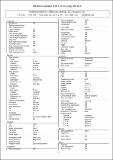| dc.contributor.author | Doehrmann, Oliver | |
| dc.contributor.author | Ghosh, Satrajit S | |
| dc.contributor.author | Polli, Frida E | |
| dc.contributor.author | Reynolds, Gretchen O | |
| dc.contributor.author | Horn, Franziska | |
| dc.contributor.author | Keshavan, Anisha | |
| dc.contributor.author | Triantafyllou, Christina | |
| dc.contributor.author | Saygin, Zeynep M | |
| dc.contributor.author | Whitfield-Gabrieli, Susan | |
| dc.contributor.author | Hofmann, Stefan G | |
| dc.contributor.author | Pollack, Mark | |
| dc.contributor.author | Gabrieli, John D | |
| dc.date.accessioned | 2012-04-06T11:47:03Z | |
| dc.date.available | 2012-04-06T11:47:03Z | |
| dc.date.issued | 2012-04-06 | |
| dc.identifier.uri | http://hdl.handle.net/1721.1/69968 | |
| dc.description | Supplementary material used in the analysis of data for submitted paper. | en_US |
| dc.description.abstract | Context: Current behavioral measures poorly predict treatment outcome in social anxiety disorder (SAD). This is the first study to examine neuroimaging-based treatment prediction in SAD.
Objective: To measure brain activation in patients affected by SAD as a biomarker to predict subsequent response to cognitive behavioral therapy (CBT).
Design: Functional magnetic resonance imaging (fMRI) data were collected prior to CBT intervention. Changes in clinical status were regressed on brain responses and tested for selectivity for social stimuli.
Setting: Patients were treated with protocol-based CBT at anxiety disorder programs at Boston University or Massachusetts General Hospital and underwent neuroimaging data collection at MIT.
Patients: Thirty-nine medication-free patients meeting DSM-IV criteria for the generalized subtype of social anxiety disorder.
Interventions: Brain responses to angry versus neutral faces or emotional versus neutral scenes were examined with fMRI prior to initiation of CBT.
Main outcome measures: Whole-brain regression analyses with differential fMRI responses for angry versus neutral faces and changes on the Liebowitz Social Anxiety Scale as the treatment outcome measure.
Results: Pretreatment responses significantly predicted subsequent treatment outcome of patients selectively for social stimuli and particularly in regions of higher-order visual cortex. Combining the brain measures with information on clinical severity accounted for more than forty percent of the variance in treatment response, and substantially exceeded predictions based on clinical measures at baseline. Prediction success was unaffected by testing for potential confounding factors such as depression severity at baseline.
Conclusion: The results suggest that brain imaging can provide biomarkers that substantially improve predictions for the success of cognitive behavioral interventions, and more generally suggest that such biomarkers may offer evidence-based, personalized medicine approaches for optimally selecting among treatment options for a patient.
Clinical trial registration at www.clinicaltrials.gov (Identifier: NCT00515879): http://clinicaltrials.gov/ct2/show/NCT00515879?term=Hofmann&rank=1 | en_US |
| dc.description.sponsorship | Oliver Doehrmann is supported by a postdoctoral fellowship by the Deutsche Forschungsgemeinschaft (DO-1469/1-1). Neuroimaging was supported by the Poitras Center for Affective Disorders Research. The authors gratefully acknowledge the Athinoula A. Martinos Imaging Center at McGovern Institute for Brain Research for providing an excellent neuroimaging environment. Dr. Hofmann is a paid consultant by Merck/Schering-Plough and supported by NIMH grant MH078308. Dr. Pollack also supported by NIMH grant MH078308. He additionally is a member of the advisory boards of or a consultant for Brain Cells, Eli Lilly, Johnson and Johnson, Medavante, Labopharm, Mindsite, Otsuka, Targia Pharmaceuticals, Pfizer. He has received research grants from Bristol Myers Squibb, Euthymics, Forest Laboratories, GlaxoSmithKline, Eli Lilly, NCCAM, NIDA, NIMH. CME supported activities of Dr. Pollack were sponsored by Astra-Zeneca, Sepracor, Pfizer. He holds equity in Medavante, Mensante Corporation, Mindsite, Targia Pharmaceuticals and receives royalties for SIGH-A, SAFER interviews. | en_US |
| dc.rights | Attribution 3.0 United States | en |
| dc.rights.uri | http://creativecommons.org/licenses/by/3.0/us/ | en |
| dc.subject | pattern analysis, social anxiety disorder, nipype, scikit-learn | en_US |
| dc.title | Supplementary material: Predicting treatment response in social anxiety disorder from functional magnetic resonance imaging | en_US |
| dc.type | Software | en_US |
